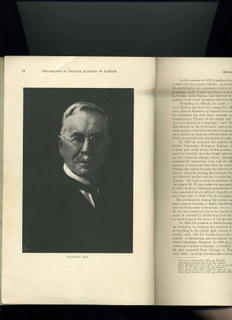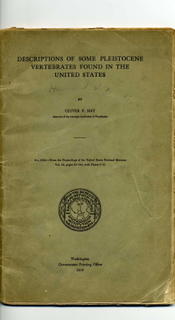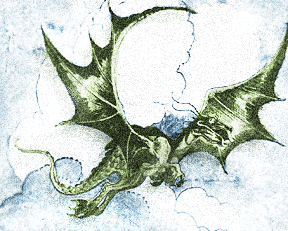
Diplodocus
This illustration of Diplodocus was prepared by the artist Mary Mason Mitchell in 1910 under the direction of Oliver Perry Hay (1846-1930). Hay was not an employee of the Smithsonian Institution, but he held the title Research Associate, and had office space at the National Museum of Natural History, Smithsonian Institution.
Publication:
Hay, Oliver P. 1910. On the Manner of Locomotion of the Dinosaurs, Especially Diplodocus, with Remarks on the Origin of the Birds. Proceedings of the Washington Academy of Sciences, vol. 12, pp. 1-25.
from the Historical Art Gallery, National Museum of Natural History, Smithsonian Institution
******************************************************
This summer marked the 100th anniversary of my maternal grandfather's excursion through France via bicycle. In June 1905, at the age of 21, he, along with two college classmates, boardedThe City of Glasgow, a cattle boat, in Baltimore, Maryland, to work their way across the Atlantic to England. After traveling through the United Kingdom for several days, he and his chums crossed the English Channel and disembarked at Calais, France. From there, they journeyed to Marseilles in southern France by "wheel," then traveled by train from Arles to Bordeaux then on to Paris where the little band had a few adventures. They left France by way of Le Havre, crossed the channel to England, then returned home by steamer to New York City then back to Illinois.
My grandfather kept a journal of his travels. This diary provides a glimpse at a time past and into the thoughts of a man whose familial legacy was known to me, but whom I never really knew because he died before I was born. Based on recollections of my mother, aunts and uncles, I knew my grandfather was a pillar of the community and a good church-goer, a Presbyterian, I believe. However, my grandfather as a young man offered decidedly jaundiced observations on religion. This makes me wonder if he practiced his faith in its benign form as described by Richard Dawkins' article, Opiate of the Masses, published in Prospect,
As with many drugs, refined Gerin oil [Dawkins' pharmaceutically derived allusion to religion - Doc Bushwell] in low doses is largely harmless, and can even serve as a social lubricant on occasions such as marriages, funerals and ceremonies of state. Experts differ over whether such social use, though harmless in itself, is a risk factor for upgrading to harder and more addictive forms of the drug.
Religion was not viewed as any kind of all consuming occupation of thought on either the maternal or paternal side of the family even as it served as a social lubricant in our community. My maternal grandfather vehemently believed that tolerance of others' creeds was not enough, but that acceptance was the ideal. He eschewed dogma, and thus had no use for fundamentalism of any stripe. This might explain why I was quickly yanked out of a Sunday school class after telling my mother and father that I had a heated argument with a Sunday school teacher over the question of "Does God hear the prayers of the Jews?" The instructor stuck to his surpisingly fundie-for-a-mainstream-Prod assertion that God did not hear the prayers of his Chosen People. Not long after the incident, the Sunday school teacher was no longer instructing 10 and 11 year old students. This experience left an indelible imprint on my young mind: religion could be pretty fucked up.
The study of science, including Darwin's Theory of Evolution, in my family was never in conflict with the benign doses of Gerin oil imbibed by our household. In fact, my scientific curiosity was abundantly encouraged by my father, who studied bacteriology and chemistry as a college student, and my mother, the descendant of my enlightened grandfather. There was never any doubt that we shared common ancestry with the great apes, and that all in my little world, humans in the house, cattle in the pasture, and corn in the fields, traced our lines back to primordial ooze. With a nod to Stephen Jay Gould's writings in
Rock of Ages, our Sunday attendance at and activity in the local Methodist church occupied a separate magesterium from the realm of science. This was the rubric from my earliest memories.
When I was a little kid, my response to the What-do-you-want-to-be-when-you-grow-up query was, "A paleontologist!" Like many kids, I was infatuated with dinosaurs and the great mammals of the Pleistocene such as sabre-toothed cats, dire wolves and mammoths. My sister was 15 years my senior so when I was around five or six years old, and squeaking out that 20 dollar word, "paleontology," which no doubt served as a parlor trick for my mother's bridge club, she let me look at her college biology textbooks. I could read reasonably well at the time, and tried to pick out bits from her books. As I grew up, I continued to expand on my knowledge, but eventually veered from the naturalist sciences to the molecular.

My grandfather mentioned "Uncle Perry" in his diary. Oliver Perry Hay was my grandfather's father's brother, and thus my great-great uncle. When I was a kid with paleontological aspirations, I remember my mother saying that her father's uncle was a paleontologist. As an undergraduate in the days before the Internet, I looked up Uncle Perry in Who's Who of American Scientists in the college biology library and learned a little more about him. I learned even more about my relative this past summer, when my mother gave me the old monograph (cover pictured along with a photo of Uncle Perry),
Descriptions of Some Pleistocene Vertebrates Found in the United States, 1920, Proc. United States National Museum, 58: 83-146,written by Uncle Perry and his memorial biography, written by his son, William P. Hay. She believed I, among all the family, would most appreciate these old papers, and she was right.

Uncle Perry's primary interest was vertebrate paleontology. He published numerous monographs, including articles on evidence for early man in North America. His most significant contribution to the field was an authoritative two volume bibliography and catalogue of Pleistocence vertebrates. This remains an important reference in the field. Uncle Perry's chronology follows:
- born in Saluda, Indiana, on 22 May 1846.
- moved with family to farm near Bradford, Illinois
- 1870: A.B., Eureka College, Illinois
- 1870-1872: professor of natural sciences, Eureka College
- 1873: A.M., Eureka College
- 1874-1876: professor of natural sciences, Oskaloosa College, Iowa
- 1876-1877: graduate student at Yale University
- 1879-1892: professor of biology and geology, Butler College
- 1884: Ph.D., Indiana University
- 1884-1888: assistant, Arkansas Geological Survey
- 1890-1891: president, Indiana Academy of Science
- 1891-1894: assistant, Indiana Geological Survey
- 1895-1897: assistant curator of zoology, Field Museum of Natural History
- 1901-1907: assistant, then associate, curator of vertebrate paleontology, American Museum of Natural History, NYC
- 1902-1905: associate editor, American Geologist
- 1902: publishes his Bibliography and Catalogue of the Fossil Vertebrata of North America
- 1907-1911: returns to Washington; pursues private investigations in paleontology
- 1908: publishes his The Fossil Turtles of North America
- 1912-1917: research associate, Carnegie Institution, Washington, D.C.
- 1917-1926: associate, Carnegie Institution
- 1923-1927: publishes his The Pleistocene of North American, in three volumes
- dies at Washington, D.C., on 2 November 1930.
As noted in the time line, Uncle Perry attended
Eureka College. It was convenient for him and moreover, according to his biography:
He was probably influenced in this selection by the fact that he had united with the Christian Church (Disciples of Christ) and looked forward to entering the ministry of that demonination.
However, he was not to join the ministry:
Toward the end of his college course, his dreams of the ministry had faded away, and he had applied himself more and more to science.He supplemented the meager courses of the college by reading such scientific books as he could buy or borrow, and before he graduated had impressed his professors with his ability and promise in this field of work.
As outlined above, Uncle Perry's graduate training was somewhat prolonged, but he became a professor of geology and biology at
Butler University. In addition to courses in his specialties, he also taught chemistry and physics. However, he did not remain at Butler:
In 1892, his position at Butler having become untenable because of his views on evolution, (italics, DocBushwell), he resigned and removed to Chicago.
Apparently, Uncle Perry's advocacy of Darwin's Theory of Evolution was more than Butler University could bear, and so, he moved on. All in all, his departure was probably for the best, given the path his career took. Here was a boy who grew up on a central Illinois farm, and knew no other educational outcome than the ministry. Apparently, little Eureka College opened his eyes. That he embraced the concept of evolution in the late 19th century and pursued his interests so tenaciously is a testament to a man of rational thought, someone whom I'm proud to call a relative.
Some 113 years after my great-great uncle left Butler University, no doubt badgered out of the institution, the anti-evolutionists are still at it with the most current and visible challenge being the Kitzmiller v. Dover Area School District trial. There's plenty of press coverage:
A Web of Faith, Law, and Science in Evolution SuitDarwin's (First) Day in CourtThe National Center for Science Education's site dedicated to the trial - a Bonobo's Thumbs-up Recommendation!Although I harbored no early ecclesiatical ambition like my great-great uncle, I likewise followed a scientific path. As I matured, the social lubricant of religion, even in its most benign form, became less and less significant to me, and I arrived where I am now: an agnostic for whom religion just isn't relevant. In keeping with my maternal grandfather's legacy, channeled to me through my mother, I typically have subscribed to a live and let live philosophy toward those who embrace faith. That was fairly easy to follow when fewer did not attempt to inflict their beliefs on me or on the public at large, which irks my vague beliefs in Jeffersonian politics.
The continuing erosion of the boundaries between church and state makes my stance of tolerance more precarious. I am not taken aback by frank creationism, i.e., the young earth concept and literal interpretation of Genesis, as taught in private schools which are founded on religious fundamentalism. That is pretty much par for the course, and at least one knows exactly the footing on which the proponents of the young earth stand.
It is the insidious incursion of creationism in the guise of Intelligent Design (ID) into science curricula and public thought which elicits an especially visceral response in me. ID is a slick repackaging of creationism which is motivated by fundamentalists in sheeps' clothing. ID does not meet the criteria for a bona fide scientific theory yet speaks in the language of science. As with its earlier incarnation of "creation science," ID has recruited a few scientists to speak on its behalf. It is often difficult for the public at large to understand that this is not a debate of two scientific theories, but of a religious belief versus a scientific theory. The popular media does not help matters much when they attempt to be "balanced" and "pluralistic, " sending in reporters who are more focused on public affairs than science-based journalists, with Cornelia Dean, a science writer for the New York Times among the notable exceptions.
As it stands, the scientific underpinnings of the theory of evolution, rightly named as the central unifiying concept in biology, are complex and cannot be readily explained in the age of soundbites and fast, flashy graphics. If it is true that many Americans cannot provide the definition of a molecule, then the scientific community is in for a real challenge, but it is one which cannot be ignored. It is essential for the scientific community to speak out against ID and in support of evolution. The National Center for Science Education (see my list of links to the right) provides a number of articles and links to prominent scientific organizations which have made public statements regarding ID.
As a practicing scientist and as a parent, I keep an eagle eye on science curriculum although in the school districts which my kids have been and are currently enrolled don't reside in communities which would brook teachings in ID. Besides, my kids are beyond evangelical hope as evidenced by their desire for Flying Spaghetti Monster posters to hang up in their rooms.
Maybe my visceral reaction to ID is bred in my bones from my common ancestry with Uncle Perry. I can only imagine that he would be thrilled by the scientific advancements in evolutionary biology which has allowed us to see our molecular fossil tree. I can only imagine he would be disheartened that the irrational, fearful reaction to evolution continues, and that people still are unable to separate the two magesteria. I can also imagine that he might just look up from his careful studies of Pleistocene fossils and add his voice to the growing chorus of scientists who are finally raising their heads from their lab benches and speaking out against ID, my small voice among them.








